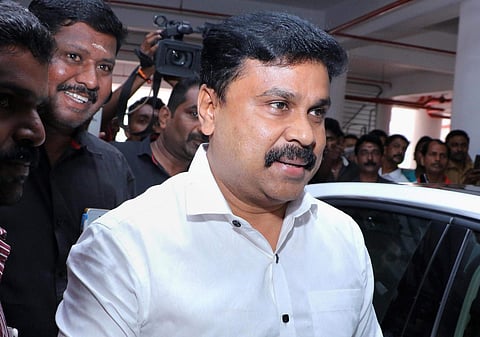Malayalam actress molestation: Two years since Dileep’s arrest, case still in no man’s territory
KOCHI: SC 118/18. The number may not ring a bell with anyone, at least most people. This is the case number of the sensational actress abduction and rape case in which leading Malayalam actor Dileep was arrested - exactly this day (July 10) two years ago.
To recap, on February 17, 2017, a young Mollywood actress was abducted by a gang and was molested inside a moving vehicle.
Her videos were also recorded. An FIR was registered at the Nedumbassery police station on the same day.
Nearly two-and-a-half years after the incident, the case has reached nowhere. To be precise, the trial of the case - before the Additional Sessions Court in Kochi - is yet to commence.
“In November 2017, we filed the chargesheet in the case. However, even after 21 months after filing the chargesheet, the trial could not commence,” said a police officer who was part of the Special Investigation Team (SIT) said.
Following the request of the survivor, CBI Court Judge Honey M Varghese was designated to conduct the trial in the case by Kerala High Court.
However, Dileep approached the Supreme Court to get a copy of the video footage recovered by the police in the case, resulting in the trial getting stayed since April this year.
The petition will be considered by the Supreme Court again on July 23.
“It’s a deliberate attempt to delay the investigation,” said the police officer, who wished not to be named.
A similar observation was made by the Kerala High Court in March this year when Dileep approached the court seeking a copy of the video footage.
The court early this year directed to complete the trial proceeding within six months.
Ultimately the delay will be a loss for the victim and the state, felt a legal officer involved in the case.
“What will happen if video footage handed over to Dileep gets leaked and uploaded on social media? Dileep is asking for the video clipping which he has not recorded. If the same stance is taken in the cases of similar nature, then the survival of victims will be in danger,” he said.
However, senior advocate B Raman Pillai who represents Dileep told Express that there was no purposeful delay.
“It is all part of legal proceedings. Dileep has the right to access the evidence used against him in the case. He has all the right to defend the case,” he said.
Five of 10 accused out on bail
Of the 10 accused facing trial, five are out on bail while the remaining five are still in Central Prison, Viyyur. Sunil N S alias Pulsar Suni, Martin Antony, Manikandan B, Vijeesh V P and Pradeep are still in judicial custody. Salim alias Vadival Salim, Charly Thomas, Dileep, Sanil Kumar and Vishnu are out on bail. There are around 470 witnesses and 400 documents to be examined by the court as part of the trial.
What judge P Rajendra Prasad says
The term ‘electronic records’ has been given the same meaning as that assigned to it under the IT Act.
IT Act provides for “data, record or data generated, image or sound stored, received or sent in an electronic form or microfilm or computer-generated microfiche.”
The definition of ‘admission’ (Section 17 of the Evidence Act) has been changed to include a statement in oral, documentary or electronic form which suggests an inference to any fact at issue or of relevance.
New Section 22A has been inserted into the Evidence Act to provide for the relevancy of oral evidence regarding the contents of electronic records.
It provides that oral admissions regarding the contents of electronic records are not relevant unless the genuineness of the electronic records produced is in question.
New Sections 65A and 65B are introduced to the Evidence Act under the Second Schedule to the IT Act.
Section 65A provides that the contents of electronic records may be proved in accordance with the provisions of Section 65B.
Section 65B provides that notwithstanding anything contained in the Evidence Act, any information contained in an electronic record is deemed to be a document and is admissible in evidence without further proof of the original’s production, provided that the conditions set out in Section 65B are satisfied.

